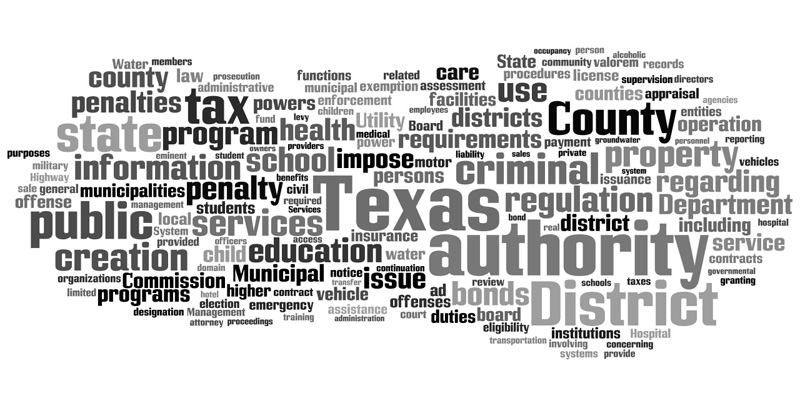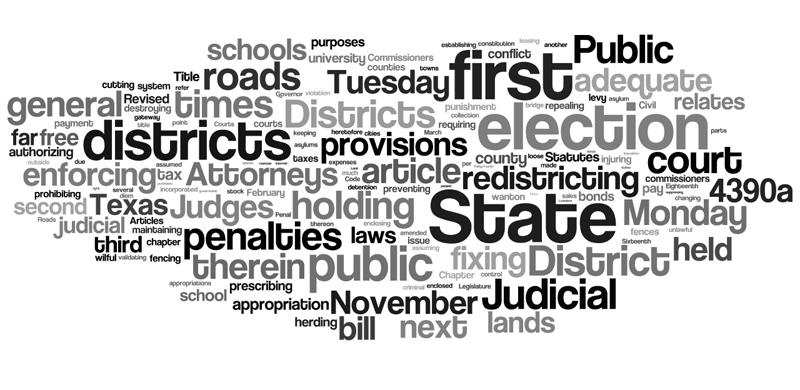National Library Week 2020
Apr 20
Apr 20
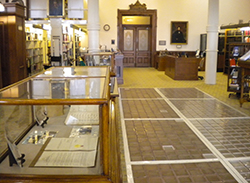
Apr 10
Apr 10
This week, April 9-15, 2017, is National Library Week. Although the LRL is quite busy with activities for the 85th Texas Legislature, we would like to recognize and congratulate all of our many amazing colleagues working in libraries across the nation.
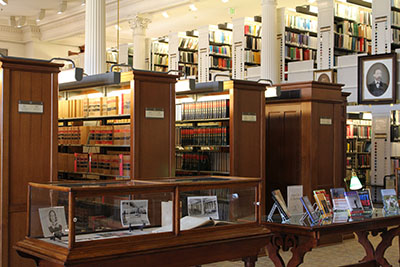 To find out more about what we do, as well as the variety of resources we provide, we invite you to visit and explore our website. And don't forget to follow us on Twitter and Pinterest, read our blog, or subscribe to one of the library's RSS feeds. We use these platforms to share useful information and resources related to Texas and the Texas Legislature.
To find out more about what we do, as well as the variety of resources we provide, we invite you to visit and explore our website. And don't forget to follow us on Twitter and Pinterest, read our blog, or subscribe to one of the library's RSS feeds. We use these platforms to share useful information and resources related to Texas and the Texas Legislature.
We aim to provide the best tools and services available for Texas legislative research, and we are proud to continue serving members of the Texas Legislature, state agencies, and the public.
This week, the Texas Legislative Reference Library joins libraries across the U.S. in celebrating the dynamic changes that are happening in today's libraries. April 10-16 is National Library Week, a time to highlight the tools and services that modern-day libraries offer to meet the needs of the communities they serve.
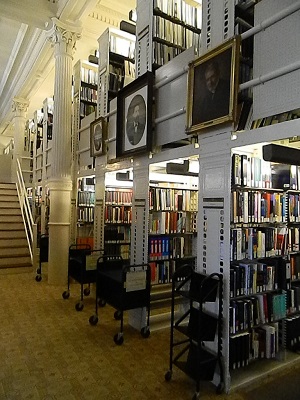 During the interim, our work at the library continues full speed. Forming the backbone to much of this work is an active digitization program that puts legislative history resources online at users' fingertips. As a result of digitization, our patrons can better access library resources, and answering patron questions has been greatly streamlined for our staff.
During the interim, our work at the library continues full speed. Forming the backbone to much of this work is an active digitization program that puts legislative history resources online at users' fingertips. As a result of digitization, our patrons can better access library resources, and answering patron questions has been greatly streamlined for our staff.
Much of our digitization work has been facilitated by the acquisition of high-speed scanners and a book scanner that has enabled us to work with fragile and tightly bound items.
The library is the legal custodian of legislative bill files from the 63rd Legislature (1973) to the present, and scanning these bill files, as well as older bill files in the collection of the Texas State Library and Archives Commission, is one of our major ongoing projects. After bill files are scanned, they are made available online through our Legislative Archive System. This system offers basic and advanced searching, and adds value to bill files by linking related newspaper clips, interim reports, and other resources. The system currently contains bills files going back to the 33rd Legislature (1913), and scanning for earlier sessions is in progress.
In a related project, the library has been scanning legislative committee minutes. These are made available through a standalone database on our website, and have also been incorporated into the Legislative Archive System.
The library's daily newspaper clipping service began in the early 1970s, and for many years was assembled by cutting articles out of newspapers and pasting them onto sheets of paper. In the last decade, "the clips" has evolved into a nearly paperless service, with articles distributed digitally, and the availability of an online, searchable database of clips. Since many Texas newspapers do not provide historical indexes, the clips database is a favorite, and often crucial, tool for background research, allowing capitol staff to search by subject, headline, or author for articles back to 1901.
For the past several years, each article in the clips has also been linked to any bills, court documents, or reports mentioned in the article. This valuable service makes it simple to locate a list of articles about a bill or to provide a copy of reports and studies referred to (often vaguely) in articles. A recently added feature groups together key court documents related to a case mentioned in a newspaper article.
The library began scanning journals in 2006 with a goal of making the complete collection of House and Senate journals from the Republic of Texas (1836) to the present available online. Legislative journals are a rich source of information that contain the proceedings of the legislature on any given day of session, as well as speeches, gubernatorial documents, and in some cases, legislative research reports. They are often the only source of legislative history for early bills.
Since the start of the project, journals from the Republic of Texas (1836) through the 28th Legislature (1903) have been digitized and put online, and most journals from 1951 through the present are also available online. Future phases of the project include making the digitized journals text-searchable and integrating them into the Legislative Archive System.
During the interim, many of our projects focus on recapturing the history of the Texas Legislature and making it available online. Not long ago, answering simple questions about a member's term of service or committee membership required consulting a card file and stacks of books, and more complicated questions might have required days or weeks of intricate research. All that has changed since the library developed the Texas Legislators: Past and Present database, which digitized much of the information contained in our card files and stores member-related information we have compiled from journals and other sources. Today, many of the member-related questions we receive can be answered through a simple database query.
Over the past several years, we have built databases to store detailed information on specialized topics such as vetoes and constitutional amendments. As part of the project, we collect and scan original documents like veto messages issued by the governor. Having this information has enabled us to answer a variety of questions more easily and more quickly. Our vetoes system is particularly useful after the end of a legislative session, and our constitutional amendments system is heavily used leading up to an election in which proposed constitutional amendments are on the ballot.
The library has other digitization projects in addition to those mentioned here, and we are happy to answer questions about them. We aim to provide the best tools and services available for Texas legislative research.
Apr 13
The LRL continues to serve members of the Texas Legislature from its location in the north wing of the Capitol between the House and Senate chambers. As part of the 1990s Capitol renovation, the library was identified as a significant space within the Capitol for its historical and architectural importance, and was selected to receive an adaptive historical room treatment. The library is open to the public, so please drop by and visit us during National Library Week or any time you are in the area.
| In celebration of National Library Week last week, we invited you to participate in our second annual game of LRL Trivial Pursuit! Below are the answers found in the legislative and historical resources on our website, Pinterest site, Twitter feed, blog, and even one in the Library in the Capitol, Room 2N.3. |
|
Who was the youngest Texas State Senator? Answer: Temple Lea Houston, born on August 12, 1860 during his father Sam Houston's last term as governor, has the distinction of being the youngest senator in the history of the Texas Legislature. He served in the 19th and 20th Legislatures, and first took the oath of office on January 13, 1885, when he was only 24 years old. No one challenged his qualifications, although Article III, § 6 of the Texas Constitution of 1876 required senators to be at least 26 years of age. [Image: State Preservation Board] Source: LRL Pinterest board, "Texas Tidbits," highlighting people and places in Texas history. |
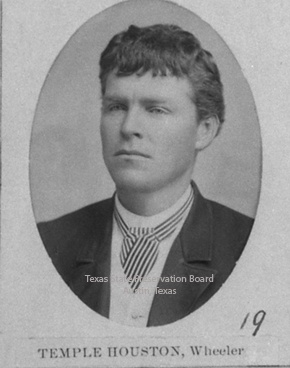 |
|
When was the First Irrigation Act passed in Texas? Answer: March 19, 1889, SHB 298, 21st Legislature, Regular Session, An Act to encourage irrigation, and to provide for the acquisition of the rights to the use of water. The Act established the doctrine of prior appropriation; Section 2 of the Act declared all the unappropriated waters of every river or natural stream within the arid portion of the state to be the property of the public and may be acquired by appropriation through a "certified filing" with the County Clerk. Source: LRL Water Law Timeline, which chronicles significant Texas water legislation, court decisions, and state water plans, and highlights years of drought. |
 |
What is the Official State Native Shrub of Texas? Answer: The Official State Native Shrub is the Texas Purple Sage (Leucophyllum frutescens). Designated by HCR 71, 79th R.S. (2005) authored by Rep. Dennis Bonnen and sponsored by Sen. Mike Jackson. [Image: Marcus, Joseph A., Lady Bird Johnson Wildflower Center] Source: LRL Pinterest board, "State Symbols," a complete list of over 60 state symbols of Texas, linked to the legislative resolutions that designated them. |
|
Fact or fiction: A Texas anticrime law requires criminals to give their victims 24 hours' notice, either orally or in writing, and to explain the nature of the crime to be committed. Answer: FICTION. In 1973, Rep. James “Jim” Kaster (D-El Paso) filed HB 110, which proposed to make it a crime to commit a crime without providing at least 24 hours' notice to the intended victim. The bill did not pass and did not become law. You can read the proposed statute entitled "Failure to Warn Victim of Crime" in the LRL Legislative Archive System. Source: LRL's current exhibit in the Library, "Texas Laws: Fact or Fiction?" |
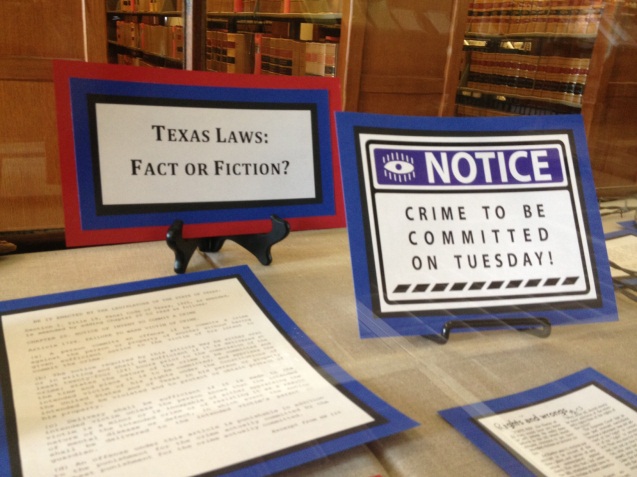 |
|
What is the best subject to search on Texas Legislature Online for bills on the use of dedicated funds? Answer: State Finances--Management & Control (I0748). Source: LRL What's New blog, Bills in the News: Dedicated Funds, February 26, 2013. In our "Bills in the News" blog series during session, the library highlights legislative issues with suggestions on how to do bill searches, as well as related resources. You can search our blog by going to our home page, www.lrl.state.tx.us, and enter your search terms in the "site" search box. |

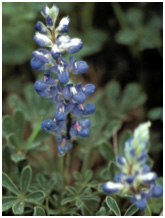 Answer: FALSE, in most cases. The bluebonnet was first designated the state flower by the Legislature in 1901 as the Lupinus subcarnosus and in 1971 later expanded to include the Lupinus Texensis and any other variety of bluebonnet.
Answer: FALSE, in most cases. The bluebonnet was first designated the state flower by the Legislature in 1901 as the Lupinus subcarnosus and in 1971 later expanded to include the Lupinus Texensis and any other variety of bluebonnet. 3. Which former House member from Washington County cast his first presidential vote for Grover Cleveland, was invited to attend the inaugural ball for Governor James S. Hogg, and was a relative of one of the writers of the Texas State Flower Song, "Bluebonnets"? [Hint: this one may require a field trip to Capitol Room 2N.3!]
3. Which former House member from Washington County cast his first presidential vote for Grover Cleveland, was invited to attend the inaugural ball for Governor James S. Hogg, and was a relative of one of the writers of the Texas State Flower Song, "Bluebonnets"? [Hint: this one may require a field trip to Capitol Room 2N.3!]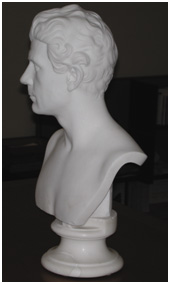 4. There are two busts in the artwork collection on display in the LRL. One is Sam Houston, who is the other? [Hint: this one may require a field trip to Capitol Room 2N.3!]
4. There are two busts in the artwork collection on display in the LRL. One is Sam Houston, who is the other? [Hint: this one may require a field trip to Capitol Room 2N.3!] Article III, Section 35 of the Texas Constitution requires bills to have titles, commonly called captions, intended to give the legislators and the public reasonable notice about the bill's subject.
Article III, Section 35 of the Texas Constitution requires bills to have titles, commonly called captions, intended to give the legislators and the public reasonable notice about the bill's subject.
The Legislative Archive System includes captions for all bills from the 62nd Legislature (1961) through the 82nd Legislature (2011), as well as captions for all enrolled bills back to the 18th Legislature (1883). The Legislative Archive System can be used to search for bills by caption, and the captions can also be used to give some idea about the topics the Legislature was considering each session.
For National Library Week, we have created a pair of word clouds using captions from enrolled bills for the 82nd Legislature:
